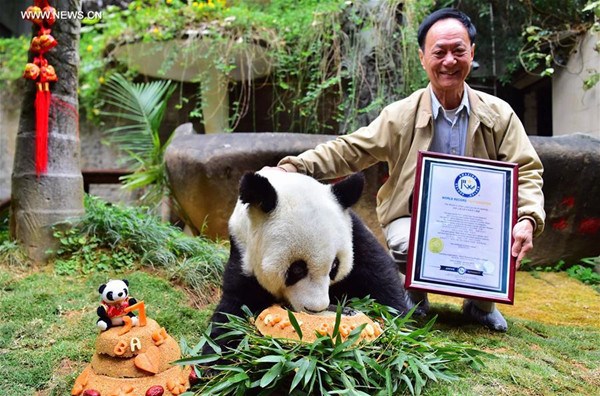
Chen Yucun, director of the panda research and exchange center, shows the certificate of "the world's eldest giant panda in captivity" beside giant panda Basi at the panda research and exchange center in Fuzhou, capital of southeast China's Fujian Province, Jan. 17, 2017. Basi, world's eldest giant panda in captivity, turns to 37 years old, an equivalent of more than 100 human years. Basi was born in 1980 in Baoxing County, southwest China's Sichuan Province. And she is prototype for mascot Panpan for the 1990 Beijing Asian Games. (Xinhua/Wei Peiquan)
The world's oldest captive panda celebrated her 37th birthday, equivalent to more than 100 human years, on Wednesday in east China's Fuzhou City, capital of Fujian Province.
Basi, born in 1980, is the oldest, and possibly the most famous, panda on the Chinese mainland. In 1990, she was chosen as the model for Pan Pan, the mascot of the Beijing Asian Games. She got her name after being rescued from the Basi Gorge in Baoxing County of southwest China's Sichuan Province.
Basi moved to Fuzhou in 1984. She is generally in good health now, said Chen Yucun, director of the Strait Panda Research and Exchange Center in Fuzhou. "She eats and sleeps well and moves freely," Chen said.
Compared with ten years ago, Basi's heart beat has dropped from 110 per minute to 60 per minute and she does much less sports than before. Her activity time is usually less than an hour every day and she spends 21 hours asleep, but she has a good appetite and her weight stays around 100 kg.
"Our biggest worries are angiosclerosis and hypertension. We fear she may suffer sudden angiorrhexis," Chen said. "We have four people taking turns to take care of her and six surveillance cameras to monitor her activities."
"We hope she will become the most long-lived panda," Chen said.
Jia Jia in Hong Kong was the world's oldest living captive panda when she died in October 2016 aged 38..
Giant pandas are an endangered species. At the end of 2013 there were an estimated 1,864 giant pandas in the wild, mostly in the provinces of Sichuan and Shaanxi. There are also 422 in captivity.
The average lifespan of wild pandas is 15 years, while those in captivity usually live longer due to better nutrition and living conditions.
Experts believe that Basi's longevity in Fuzhou, a place very different from the panda's natural habitat, has important scientific research value.


















































